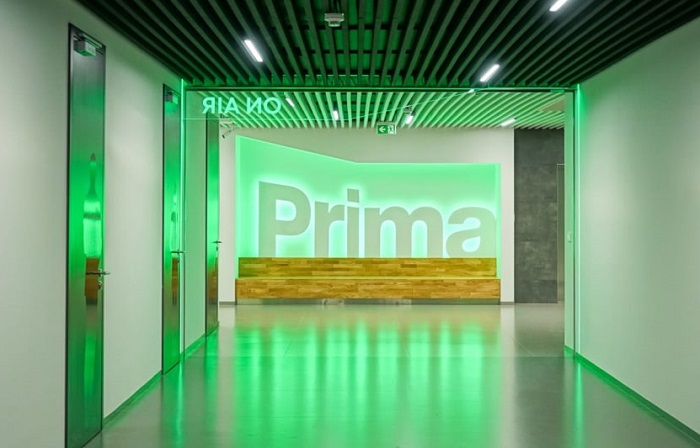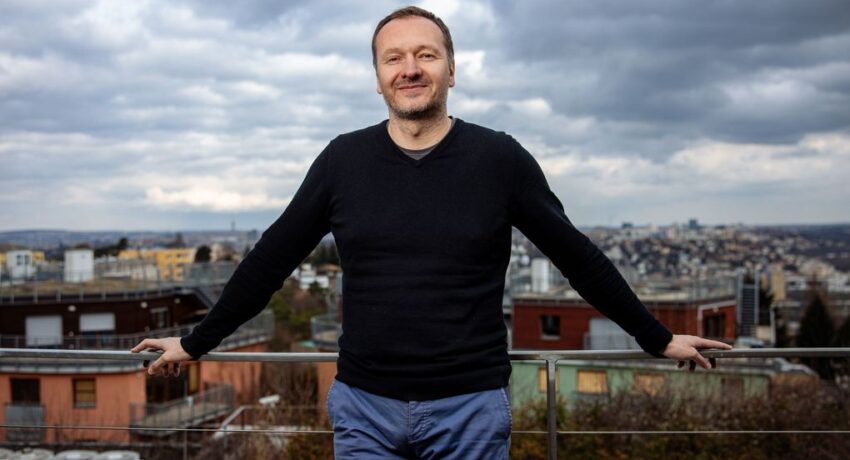In the last month alone, two more video libraries have been launched in the Czech Republic. Eight services are already competing over paying customers that will watch movies and TV series on their platform each month. Voyo, operated by Nova TV, has just reached 500,000 subscribers for the Czech Republic and Slovakia combined, and is estimated to be catching up with Netflix.
There are more reasons for this. The media company CME, which Voyo and Nova are a part of, was bought by the financial group PPF for almost CZK 50 billion a few years ago. In order to revive the dormant video library, it moved the most watched Nova series, Ordinace v růžové zahradě 2, to it. And she put media manager Daniel Grunt in charge of the video library. All this at a time when Czechs, shut in at home because of the pandemic, started paying more for films and TV series on the Internet.
With the media staggering from one crisis to the next, Grunt built Nova a business with estimated revenues of up to CZK 1 billion a year in two years. And while rival HBO has stopped making films and TV series in the Czech Republic due to cost-cutting, Voyo and Nova announced 46 new releases last week. “We are becoming the biggest video content creators on the Czech market,” Daniel Grunt now announces in an interview with Aktuálně.cz, his first as CEO of Nova. He became the new CEO in January, when, in light of the success of Voyo, he assumed the influential post of the head of the largest Czech commercial television, which had previously been held by Vladimír Železný and Petr Dvořák. He immediately replaced Klára Brachtlova and Jan Vlček, who moved to CME.
How many streaming services do you subscribe to?
We have Voyo at home, Netflix, HBO Max, Disney+, Eurosport, Amazon Prime Video and now newly Skyshowtime. Plus Spotify for music and Xbox Gold for games, so nine services.
In addition, people pay for newspapers and websites, ad-free YouTube, podcasts, video interviews, Twitter account verification, prospectively maybe translators or artificial intelligence. Isn’t that too much?
It is too much. And I don’t think we’re going to end up paying for ten services. It’s going to get overwhelming. In America today, people pay for an average of four video services per household. That’s going to be the ceiling. In the Czech Republic, we estimate that about one million households subscribe to an average of 1.5 services. I think it will go in a similar direction to Scandinavia, where local Viaplay has taken hold alongside multinational video services like Netflix and has some three million users. In Scandinavia, people pay for an average of 2.5 services per family, and somehow it will be the same in the Czech Republic.
Do you think that Czechs will pay for, say, multinational Netflix and local Voyo on top of that?
We are betting that one local player will succeed alongside the big players and that will be our Voyo. Video services like Netflix are aware of the importance of the local factor, but they lack the knowledge of the mentality, how people live here, what are the historical stories behind them, what they like. We tailor-make content for them with that experience. It’s not just in the Czech Republic and Slovakia, Voyo has already surpassed Netflix in Slovenia, which has two million people, and it’s the market leader there, and it’s taking off nicely in Romania. Just as you have Viaplay in Scandinavia, we have the chance to become the local leader for Central and Eastern Europe.
How did we even get to the stage where we are choosing from eight video libraries? For example, there have never been so many mobile operators in the Czech Republic.
I think covid was the tipping point that taught Czechs to pay for content on the internet, and now everyone is arguing over who the money ends up with. Of course, there used to be some number of Netflix users or people paying for games or in-game purchases on the App Store and Google Play.
The increasing penetration of smartphones with data plans, when it became terribly easy to buy something online, played a major role. But it was covid that made the difference. In the end, it doesn’t matter what one pays through. The hardest thing is to get a person who has never paid for anything on the internet to spend their first penny. Then it’s on.
You just announced that Voyo has 500,000 subscribers in the Czech Republic and Slovakia. Can we say that there are about 400,000 Czechs paying?
Let’s say you’re getting close to the truth.
Yet the service started in 2011 and has been stagnant for ten years?
In short: three years ago, investment group PPF bought CME, including Nova and Voyo, assessed that the media market would grow in terms of paying for content from viewers, set a target of getting one million subscribers for Voyo by 2025, and I was tasked with this as the new head of digital content.
It was a challenge for me. When I told my friends in the business about the ambition, they tapped their foreheads wondering if I was crazy that Voyo had a few tens of thousands of subscribers after ten years of existence. Two years into the pandemic and we’re a long way from there.
According to a study last year by Nielsen Admosphere, not only has the willingness of Czechs to pay online increased, but it is higher among people aged 15 to 24 than among older people. Are you taking this into account?
The most important group for Voyo is the 25 to 45 year old group, typically young families with children. It would be tempting to go after the youngest, who are already used to paying online, but Netflix is burning its brutally expensive series into them and we can’t compete with that. Also, this is a fairly low loyalty group, it goes where the content is right now.
What about the caveat that if you don’t enter the lives of Generation Z now and show them that you care about their issues too, you’ll never reach them again?
We do everything for Voyo with the ambition of picking up a million subscribers, we can’t afford to only go after such a narrow target group. But we try to meet them on social media like TikTok or Instagram so that they have an experience and insight into what they find with us. And in early March, we’ll be launching a series called Sex O’Clock, which is enjoyably cheeky and will be watched by teenagers and 50-somethings alike. I enjoyed it. And I’m sure my 15-year-old son will enjoy watching it too.
You’ve gained hundreds of thousands of subscribers at a time when the boom is over and households have started to cut back because of inflation and energy prices. So are the wealthier people paying for Voyo?
It’s a question of what you call richer, 159 crowns a month for a bill for the whole family is less than one cinema ticket. These are people who have a computer, a smart TV or a tablet, know how to use it and are interested in new things. The internet literacy evokes the young, but at the same time that group is expanding a lot, we have quite a few subscribers over 50.
How do you know that? When you sign up for Voyo, you don’t fill in your date of birth, your gender, or where you live.
We have surveys. We didn’t ask subscribers for more data because we needed to grow quickly, so we purposely removed any barriers they would encounter on the way to payment. We wanted to make it as simple as possible. For the same reason, we don’t give people multiple subscription types to choose from.
Would Voyo have half a million viewers if it wasn’t for Ordinace v růžové zahradě 2?
It’s hard to say, it certainly helped enormously. People have been watching Ordinace for 15 years on Nova. When we moved it to the internet, it was also a symbolic message to the market that we were serious and that Voyo would not be a superstructure. We risked losing a large part of our audience. But it brought a jump in subscribers, and there are still more coming for Ordinace.
900,000 people a week watched Ordinace, so by moving to Voyo you lost advertising revenue, so you were risking tens of millions of crowns a month?
Yes. And the costs remained because we continue to make the series in the same quality, with the same faces, in the same length.
The Nova Group earns over five billion crowns a year from TV advertising, more than half of the whole market. Will that figure fall as people move online?
It’s not so black and white. I don’t believe the majority of the population will watch either streaming services or TV, it’s more likely to be a mix. Today people spend about 3.5 hours a day in front of the TV, the same as before covid, but at the same time streaming services are growing. This means people are stealing from their free time and consuming more and more entertainment. At some point it will hit a ceiling and then it will be a matter of managing that audience distribution as effectively as possible. Which will be my main task. Unilaterally growing Voyo by devouring Nova TV is not the desired outcome. Although we make more money from Voyo subscribers than we do from TV advertising.
Daniel Grunt (47)
A native of Litoměřice, Daniel Grunt studied economics at the University of Agriculture. He started in 2002 as the head of marketing of the Centrum.cz portal. He first worked at the largest Czech commercial television station, Nova, between 2008 and 2010, when Petr Dvořák, the then director, appointed him director of Internet services.
In the past decade, Grunt spent eight years building up the digital activities of rival Prima, before returning to Nova TV in February 2021 as head of new media at CME Group to develop the Voyo video library.
Last month, he replaced Jan Vlček and Klára Brachtlová as the CEO of Nova. The station is owned by financial group PPF again from 2020, having acquired it for CZK 48 billion in the purchase of Central Media Enterprises, along with its television companies in Slovakia, Romania, Bulgaria and Slovenia. Voyo also wants to succeed in all these countries.
Source: magazin.aktualne.cz















